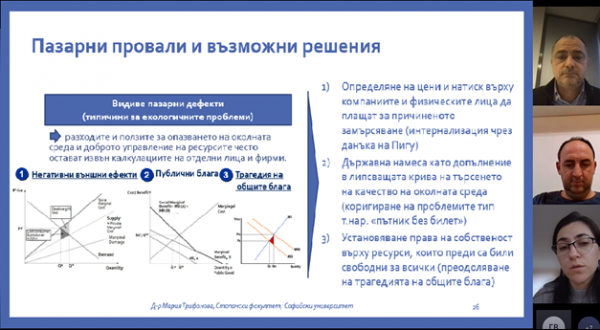06.12.2021
In December 2021 the Faculty of Economics and Business Administration (FEBA) of Sofia University organized in partnership with guest lecturers from the energy sector a series of capacity building workshops on energy markets and prices. The format of the certification training was designed to best suit the interests of journalists, media representatives and opinion makers. The topics of the training touched upon the factors and preconditions for the record braking prices of energy globally in recent months and impacts in the national and regional context. This initiative continues FEBA efforts to provide academic knowledge beyond doors of its audiences and to facilitate knowledge exchange and various views sharing on trending economic and social issues.
After the participants have got acquainted in module 1 with the structure of the electricity market in Bulgaria and the peculiarities of the regulated and market segment, Module 2 introduced them to the principles of market-oriented instruments for limiting pollution and negative environmental impacts of carbon-intensive industries. Yavor Vassilev, Manager of Libra Energy, presented the rules which European Emission Trading Scheme is based on, as well as the technical and fundamental factors that affect emission allowances’ prices.
In the last quarter of 2021, the carbon price has risen by 25% as a result of the increased coal consumption, which in turn has occurred as a consequence of rising natural gas prices and the demand for alternative substitutes. Thus, higher carbon prices have also played a role in pushing up electricity prices, but this needs to be kept in context. The International Energy Agency estimated that the effect of the sharp spike in natural gas prices in our fossil fuel-dominated energy systems is nearly eight times bigger than the effect of the increase in carbon prices. On the other hand, in the long run, more expensive carbon allowances should limit subsidizing carbon-intensive energy production (a policy option that governments tend to prefer during the energy crisis), should stimulate energy efficiency measures and new investments in local, low-carbon energy production to enhance energy system’s resilience.
Pavlin Stoyanov, lawyer with Visiaw, presented to the participants in the training session the legal framework and important documents founding the European emissions trading scheme. He outlined the objectives of the strategic and legally binding documents on European and national level in the next 10 years emphasizing on the difference between regulatory factors and those that depend on market behavior or policy choices.



